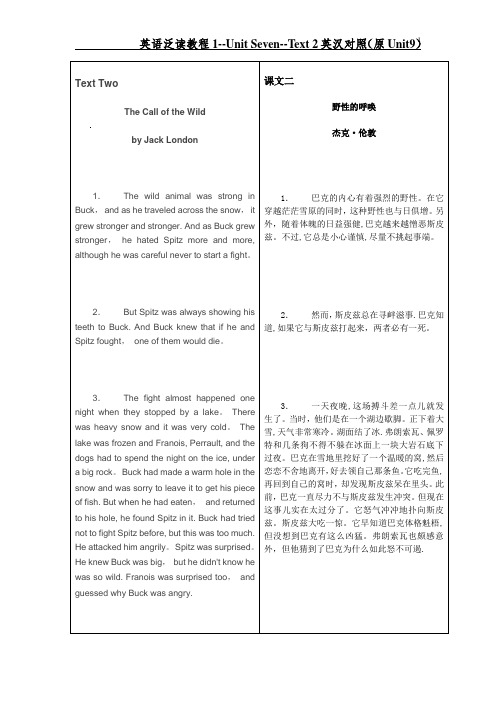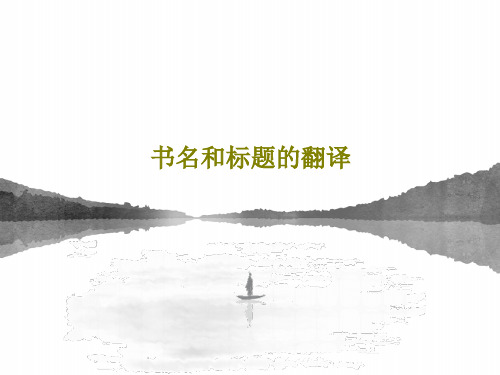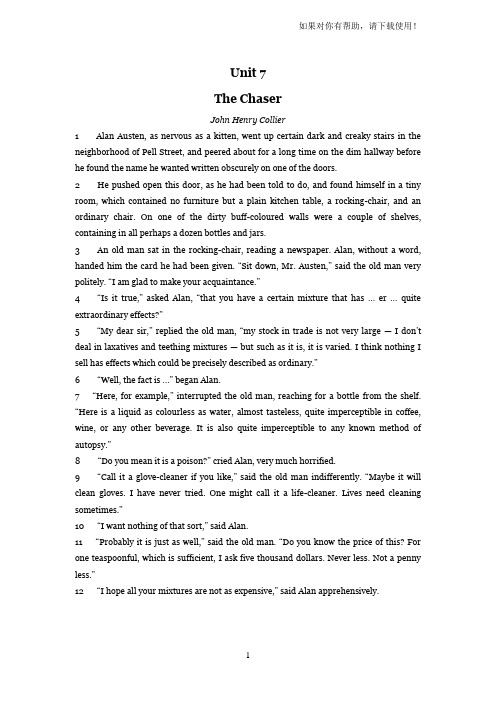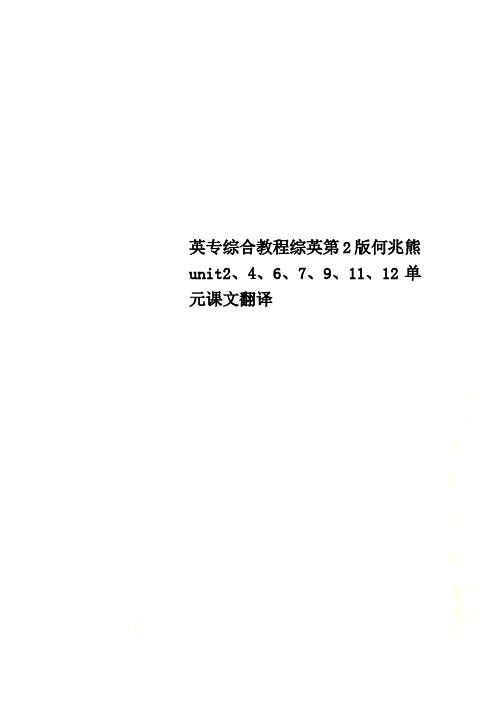第七章 书名和标题的翻译(2)
B1 Unit 7 Text 2 英汉对照(原Unit9)

Text TwoThe Call of the Wildby Jack London1.The wild animal was strong in Buck,and as he traveled across the snow,it grew stronger and stronger. And as Buck grew stronger,he hated Spitz more and more, although he was careful never to start a fight。
2.But Spitz was always showing his teeth to Buck. And Buck knew that if he and Spitz fought,one of them would die。
3.The fight almost happened one night when they stopped by a lake。
There was heavy snow and it was very cold。
The lake was frozen and Franois, Perrault, and the dogs had to spend the night on the ice, under a big rock。
Buck had made a warm hole in the snow and was sorry to leave it to get his piece of fish. But when he had eaten,and returned to his hole, he found Spitz in it. Buck had tried not to fight Spitz before, but this was too much. He attacked him angrily。
书名和标题的翻译共33页文档

6、最大的骄傲于最大的自卑都表示心灵的最软弱无力。——斯宾诺莎 7、自知之明是最难得的知识。——西班牙 8、勇气通往天堂,怯懦通往地狱。——塞内加 9、有时候读书是一种巧妙地避开思考的方法。——赫尔普斯 10、阅读一切好书如同和过去最杰出的人谈话。——笛卡儿
Thank you
Байду номын сангаас
书名和标题的翻译
1、战鼓一响,法律无声。——英国 2、任何法律的根本;不,不成文法本 身就是 讲道理 ……法 律,也 ----即 明示道 理。— —爱·科 克
3、法律是最保险的头盔。——爱·科 克 4、一个国家如果纲纪不正,其国风一 定颓败 。—— 塞内加 5、法律不能使人人平等,但是在法律 面前人 人是平 等的。 ——波 洛克
第二册Unit7参考译文(2)

课文参考译文:发现之旅——斯坦福大学校长2009年迎新演讲每年秋天,在我准备迎接斯坦福新生的演讲时,都会仔细斟酌我想要传递的讯息,并往往从我最近阅读的材料中寻找灵感。
今年夏天,我读了杰纳特布朗尼撰写的达尔文传第一卷——《航程》。
你们大多数人可能知道达尔文的一些基本情况:他22岁乘“贝格尔”号出航,在加拉帕戈斯群岛上的观察所起的作用,以及在航行结束20多年后他出版的《物种起源》。
在这本传记中,我看到新颖有趣的内容是达尔文早期的个人经历和所受的教育不仅帮助作为一名博物学家完成了“贝格尔”号的航程,而且来又帮助他完善相关理论思想,并最终发表了那部里程碑式的著作。
从早期开始,达尔文似乎都在为自己将来一生所要从事的事业做准备。
他还是一个小男孩时,就表现出了对科学的热爱,培养了作为一位细致入微、一丝不苟的自然观察家所具备的技能,以及他出色的甲虫收集能力。
在他的一生中,达尔文始终保持很高的求知欲。
作为新生,你们被招收到斯坦福大学,不仅因为你们具备学术能力,而且因为你们拥有求知欲。
就像曾在剑桥大学就读的达尔文一样,你们将会接触到优秀的老师和著名的学者。
在达尔文的学生时代,他遇到了很多老师,他们不仅教授他新的重要课程,而且成为他早期的导师。
在达尔文后来几十年的理论研究工作中,这些老师还是他从事研究的同事和指导者。
在你们就读斯坦福大学期间,我鼓励你们以达尔文为榜样,了解我们的教师。
校友们已经告诉我们:亲身了解一位老师是他们斯坦福经历中获益最大的一面。
在过去的15年中,斯坦福大学投入了大量资金为你们创造这样的机会。
利用每个机会去发现我们的老师们为何对自己的研究有如此之热情。
尽管我乐于为济济一堂的学生们上课,但我感觉最快乐的时候却是学生们来到我的办公室,与我商讨研究课题、寻求职业建议或者就某个难题寻求帮助的时候。
在达尔文的学生时代,他与约翰亨斯洛教授共同度过了许多日日夜夜,亨斯洛教授使他结识了许多科学家,之后又推荐他加入“贝尔格”号之旅。
CHAPTER 7 书名和标题的翻译

2.书名的翻译
(1)书名译名讲求简短易记,文字优美,吸引读 者,多采用汉语四字成语或四字格。如: All's Well That Ends Well 《终成眷属》 As You Like It 《皆大欢喜》 Gone with the Wind 《乱世佳人》 For Whom the Bell Tolls 《战地钟声》
(2)要弄清书名的典故,然后决定译名: 有些作家,如Ernest Hemingway(海明威) 和J.E. Steinbeck(斯坦贝克)等,喜欢引用典故作书名。 因此,这就需要我们弄清典故才能真正译好书名。 如海明威的一书名The Sun Also Rises 开始译 成《太阳也升起》,后来改成《太阳照样升起》, 后者为什么比较好呢?因为它符合原名所根据的 典故。The Sun Also Rises 源自《圣经.传道书》 中的一段话:
(4)书中地名的翻译要灵活处理,使 其能点明内容。 Waterloo Bridge 译为《魂断蓝桥》, 如果直译为《滑铁卢桥》很容易让人 想到拿破仑在此打仗,但实际上与拿 破仑打仗 毫无关系。因此,要避免误 解就需要活译。
(5)要考虑到不同的文化和社会背景,
避免误译:
吴运铎同志的《把一切献给党》:译为
One generation passeth away, and another generation cometh; but the earth abideth forever,... The sun also ariseth, and the sun goes down, and hasteth to the place where he arose... 一代人逝去,又一代人降临,可地球运 转不息,太阳照样升起,照样落下, 又慌忙赶回他那升起的家· · · · · ·
标题与书名的翻译

1. Genesis 2.Numbers 3.Judges 4.Kings 5.Chronicles 6.Psalm 7.Proverbs
•1《创世记》 •2《民数记》 •3《士师记》 •4《列王记》 •5《历代志》 •6《诗篇》 •7《箴言》
1.Tales from Shakespeare
a.《吟边燕语》 b.《莎士比亚戏剧故事集》 2.Wuthering Heights (Emily Bronte,1818-1848 ) a.《魂归离恨天》 b.《呼啸山庄》 c.《咆哮山庄》
3.A Farewell to Arms (Ernest Hemingway) a.《战地春梦》 b.《永别了,战争》 c.《永别了,武器》 d.《永别了,凯瑟琳的怀抱》
三、书名译名讲求简短易记,文字优美,多采用汉语
பைடு நூலகம்
四字成语或四字格
1. All’s Well That Ends 1《终成眷属》
Well 2.As You Like It 3.Wuthering Heights 4.Waterloo Bridge
2《皆大欢喜》 3《呼啸山庄》 4《魂断蓝桥》
5.Carve Her Name with Pride
六、关于书名的翻译方法,除上面5种之外,还有 别的方法,
如音译、音译和意译相结合,等等。 但不管用什么方法,有两条必须牢记: 一是真正看懂全书之后再决定译名; 二是译出的书名必须符合通用的翻译标准:“忠实,
通顺”,并且要有美感。
中国古典名著书名英译
1.《三国演义》Three Kingdoms or Romance of The Three Kingdoms
4.Gone with the Wind (Margaret Mitchell) a.《飘》 b.《随风逝去》 c.《随风而去》 d.《乱世佳人》 e.《往事如烟》
Unit7TheChaser课文翻译综合教程三

Unit 7The ChaserJohn Henry Collier1 Alan Austen, as nervous as a kitten, went up certain dark and creakystairsin the neighbo rhoodof Pell Street, and peeredabout for a long time on the dim hallway beforehe found the name he wantedwritten obscure ly on one of the doors.2 He pushedopen this door, as he had been told to do, and found himself in a tiny room, which contain ed no furnitu re but a plain kitchen table, a rocking-chair, and an ordinar y chair. On one of the dirty buff-coloure d walls were a coupleof shelves, contain ing in all perhaps a dozen bottles and jars.3 An old man sat in the rocking-chair, reading a newspap er. Alan, without a word, handedhim the card he had been given. “Sit down, Mr. Auste n,” said the old man very politel y. “I am glad to make your acquain tance.”4 “Is it true,” asked Alan, “that you have a certain mixture that has … er … quite extraor dinary effects?”5 “My dear sir,” replied the old man, “my stock in trade is not very large —I don’t deal in laxativ es and teethin g mixture s — but such as it is, it is varied. I think nothing I sell has effects which could be precise ly describ ed as ordinar y.”6 “Well, the fact is …” began Alan.7 “Here, for exa mple,” interru pted the old man, reachin g for a bottlefrom the shelf. “Here is a liquidas colourl ess as water, almosttastele ss, quite imperce ptible in coffee, wine, or any other beverag e. It is also quite imperce ptible to any known methodof autopsy.”8 “Do you mean it is a poison?” cried Alan, very much horrifi ed.9 “Call it a glove-cleaner if you like,” said the old man indiffe rently. “Maybe it will clean gloves.I have never tried. One might call it a life-cleaner. Lives need cleanin g sometim es.”10 “I want nothing of that sort,” said Alan.11 “Probabl y it is just as well,” said the old man. “Do you know the price of this? For one teaspoo nful, which is suffici ent, I ask five thousan d dollars. Never less. Not a penny less.”12 “I hope all your mixture s are not as expensi ve,” said Alan apprehe nsivel y.13 “Oh dear, no,” said the old man. “It would be no good chargin g that sort of price for a love potion, for example. Young peoplewho need a love potionvery seldomhave five thousan d dollars. Otherwi se they would not need a love potion.”14 “I am glad to hear that,” said Alan.15 “I look at it like this,” said the old man. “Pleasea custome r with one article, and he will come back when he needs another. Even if it is more costly. He will save up for it, if necessa ry.”16 “So,” said Alan, “you reallydo sell love potions?”17 “If I did not sell love potions,” said the old man, reachin g for another bottle,“I shouldnot have mention ed the other matterto you. It is only when one is in a positio n to obligethat one can affordto be so confide ntial. “18 “And these potions,” said Alan. “They are not just … just … er …”19 “Oh, no,” said the old man. “Their effects are permane nt, and extendfar beyondthe mere casualimpulse. But they include it. Oh, yes they include it. Bountif ully, insiste ntly. Everlas tingly.”20 “Dear me!” said Alan, attempt ing a look of scienti fic detachm ent. “How very interes ting!”21 “But conside r the spiritu al side,” said the old man.22 “I do, indeed,” said Alan.23 “For indiffe rence,” said the old man, “they substit ute devotio n. For scorn, adorati on. Give one tiny measure of this to the young lady — its flavour is imperce ptible in orangejuice, soup, or cocktai ls — and however gay and giddy she is, she will changealtoget her. She will want nothing but solitud e and you.”24 “I can hardlybelieve it,” said Alan. “She is so fond of parties.”25 “She will not like them anymore,” said the old man. “She will be afraidof the prettygirls you may meet.”26 “She will actuall y be jealous?” cried Alan in a rapture. “Of me?”27 “Yes, she will want to be everyth ing to you.”28 “She is, already. Only she doesn’t care about it.”29 “She will, when she has taken this. She will care intense ly. You will be her sole interes t in life.”30 “Wonderf ul!” cried Alan.31 “She will want to know all you do,” said the old man. “All tha t has happene d to you duringthe day. Every word of it. She will want to know what you are thinkin g about, why you smile suddenl y, why you are looking sad.”32 “That is love!” cried Alan.33 “Yes,” said the old man. “How careful ly she will look after you! She will never allow you to be tired, to sit in a draught, to neglect your food. If you are an hour late, she will be terrifi ed. She will think you are killed, or that some siren has caughtyou.”34 “I can hardlyimagine Diana like that!” cried Alan, overwhe lmed with joy.35 “You will not have to use your imagina tion,” said the old man. “And, by the way, since there are alwayssirens, if by any chanceyou should, later on, slip a little, you need not worry. She will forgive you, in the end. She will be terribl y hurt, of course, but she will forgive you —in the end.”36 “That will not happen,” said Alan fervent ly.37 “Of coursenot,” said the old man. “But, if it did, you need not worry. She would never divorce you. Oh, no! And, of course,she will never give you the least, the very least, grounds for —uneasin ess.”38 “And how much,” said Alan, “is this wonderf ul mixture?”39 “It is not as dear,” said the old man, “as the glove-cleaner, or life-cleaner, as I sometim es call it. No. That is five thousan d dollars, never a penny less. One has to be older than you are, to indulge in that sort of thing. One has to save up for it.”40 “But the love potion?” said Alan.41 “Oh, that,” said the old ma n, opening the drawerin the kitchen table, and takingouta tiny, ratherdirty-looking phial. “That is just a dollar.”42 “I can’t tell you how gratefu l I am,” said Alan, watchin g him fill it.43 “I like to oblige,” said the old man. “Then custome rs come back, later in life, when they are betteroff, and want more expensi ve things. Here you are. You will find it very effecti ve.”44 “Thank you again,” said Alan. “Good-bye.”45 “Au revoir,” said the man.解酒水艾伦·奥斯丁,紧张得像只小猫,心里七上八下、忐忑不安的进了裴尔街区的一个楼道,黑乎乎的楼梯咯吱咯吱直响。
Unit7TheChaser课文翻译综合教程三

Unit 7The ChaserJohn Henry Collier1 Alan Austen, as nervous as a kitten, went up certain dark and creaky stairs in the neighborhood of Pell Street, and peered about for a long time on the dim hallway before he found the name he wanted written obscurely on one of the doors.2 He pushed open this door, as he had been told to do, and found himself in a tiny room, which contained no furniture but a plain kitchen table, a rocking-chair, and an ordinary chair. On one of the dirty buff-coloured walls were a couple of shelves, containing in all perhaps a dozen bottles and jars.3 An old man sat in the rocking-chair, reading a newspaper. Alan, without a word, handed him the card he had been given. “Sit down, Mr. Austen,” said the old man very politely. “I am glad to make your acquaintance.”4 “Is it true,” asked Alan, “that you have a certain mixture that has … er … quite extraordinary effects?”5 “My dear sir,” replied the old man, “my stock in trade is not very large —I don’t deal in laxatives and teething mixtures — but such as it is, it is varied. I think nothing I sell has effects which could be precisely described as ordinary.”6 “Well, the fact is …” began Alan.7 “Here, for example,” interrupted the old man, reaching for a bottle from the shelf. “Here is a liquid as colourless as water, almost tasteless, quite imperceptible in coffee, wine, or any other beverage. It is also quite imperceptible to any known method of autopsy.”8 “Do you mean it is a poison?” cried Alan, very muc h horrified.9 “Call it a glove-cleaner if you like,” said the old man indifferently. “Maybe it will clean gloves. I have never tried. One might call it a life-cleaner. Lives need cleaning sometimes.”10 “I want nothing of that sort,” said Alan.11 “Probably it is just as well,” said the old man. “Do you know the price of this? For one teaspoonful, which is sufficient, I ask five thousand dollars. Never less. Not a penny less.”12 “I hope all your mixtures are not as expensive,” said Alan appre hensively.13 “Oh dear, no,” said the old man. “It would be no good charging that sort of price fora love potion, for example. Young people who need a love potion very seldom have five thousand dollars. Otherwise they would not need a love potion.”14 “I am glad to hear that,” said Alan.15 “I look at it like this,” said the old man. “Please a customer with one article, and he will come back when he needs another. Even if it is more costly. He will save up for it, if necessary.”16 “So,” said Alan, “you really do sell love potions?”17 “If I did not sell love potions,” said the old man, reaching for another bottle, “I should not have mentioned the other matter to you. It is only when one is in a position to oblige that one can afford to be so confidential. “18 “And these potions,” said Alan. “They are not just … just … er …”19 “Oh, no,” said the old man. “Their effects are permanent, and extend far beyond the mere casual impulse. But they include it. Oh, yes they include it. Bountifully, insistently. Everlastingly.”20 “Dear me!” said Alan, attempting a look of scientific detachment. “How very interesting!”21 “But consider the spiritual side,” said the old man.22 “I do, indeed,” said Alan.23 “For indifference,” said the old man, “they substitute devotion. For scorn, adoration. Give one tiny measure of this to the young lady — its flavour is imperceptible in orange juice, soup, or cocktails — and however gay and giddy she is, she will change altogether. She will want nothin g but solitude and you.”24 “I can hardly believe it,” said Alan. “She is so fond of parties.”25 “She will not like them anymore,” said the old man. “She will be afraid of the pretty girls you may meet.”26 “She will actually be jealous?” cried Alan in a rapture. “Of me?”27 “Yes, she will want to be everything to you.”28 “She is, already. Only she doesn’t care about it.”29 “She will, when she has taken this. She will care intensely. You will be her sole interest in life.”30 “Wonderful!” cried Alan.31 “She will want to know all you do,” said the old man. “All that has happened to you during the day. Every word of it. She will want to know what you are thinking about, why you smile suddenly, why you are looking sad.”32 “That is love!” cried Alan.33 “Yes,” said the old man. “How carefully she will look after you! She will never allow you to be tired, to sit in a draught, to neglect your food. If you are an hour late, she will be terrified. She will think you are killed, or that some siren has caught you.”34 “I can hardly imagine Diana like that!” cried Alan, overwhelmed with joy.35 “You will not have to use your imagination,” said the old man. “And, by the way, since there are always sirens, if by any chance you should, later on, slip a little, you need not worry. She will forgive you, in the end. She will be terribly hurt, of course, but she will forgive you —in the end.”36 “That will not happen,” said Alan fervently.37 “Of course not,” said the old man. “Bu t, if it did, you need not worry. She would never divorce you. Oh, no! And, of course, she will never give you the least, the very least, grounds for —uneasiness.”38 “And how much,” said Alan, “is this wonderful mixture?”39 “It is not as dear,” said the old man, “as the glove-cleaner, or life-cleaner, as I sometimes call it. No. That is five thousand dollars, never a penny less. One has to be older than you are, to indulge in that sort of thing. One has to save up for it.”40 “But the love potion?” said Alan.41 “Oh, that,” said the old man, opening the drawer in the kitchen table, and taking outa tiny, rather dirty-looking phial. “That is just a dollar.”42 “I can’t tell you how grateful I am,” said Alan, watching him fill it.43 “I like to oblige,” said the old man. “Then customers come back, later in life, when they are better off, and want more expensive things. Here you are. You will find it very effective.”44 “Thank you again,” said Alan. “Good-bye.”45 “Au revoir,” said the man.解酒水艾伦·奥斯丁,紧张得像只小猫,心里七上八下、忐忑不安的进了裴尔街区的一个楼道,黑乎乎的楼梯咯吱咯吱直响。
英专综合教程综英第2版何兆熊unit2、4、6、7、9、11、12单元课文翻译

英专综合教程综英第2版何兆熊unit2、4、6、7、9、11、12单元课文翻译Unit 2 Bards of the Internet1. 电话的发明,产生了一个始料不及的后果,书写过时了。
诚然,全职的写字工仍然存在,包括记者、学者以及职业写手。
大型商业中心仍然很有必要保留一些能草拟备忘录、会议纪要、新闻稿或者合同的人。
但是在举笔和拿起话筒之间选择的话,大多数人都会走便道,让手指——有时还有大脑——休息片刻。
2. 与之相比,当前计算机网络上发生的现象就更为惊人了。
每个夜晚,当人们本应该看电视的时候,成千上万的计算机用户坐在键盘前,点击进入“电脑服务”、“奇才”、“美国在线”或互联网,并开始打字——发电子邮件、发布信息、聊天、夸夸其谈、谩骂,甚至创作短篇小说和诗歌。
当麦克卢汉所说的媒介正在淘汰莎士比亚时代的媒介时,网络世界正经历着18世纪以来信件书写最为迅猛的发展。
3. “我确信电子邮件和网上会议正在教会整整一代人写文章是多么有用,可以灵活到何种程度,”《旧金山纪事报》的专栏作家乔恩·卡洛尔这样写道。
石山图书出版社的编辑帕特里克·尼尔森·海顿把当今的电子公告板比作18世纪末19世纪初的“文字盒”:这是个小盒子,盒内的文章在多人间传递,每人经手时都会增加一些句子。
来自亚利桑那大学的副主编大卫·塞维尔则将网络写作喻为马克·吐温在19世纪60年代在旧金山所发现的文学景象,“当时人们将新闻报道嫁接到夸张的民俗传统故事之中,创造了新的新闻报道方式”。
更有甚者,有人想起了汤姆·潘恩和美国革命时期政治小册子作家,甚至还想起了伊丽莎白一世时期,古腾堡活字印刷术的发明,令一代英国作家沉迷在语言之中。
4. 可是这种比较又引出一个问题:如果说当今的网络写作代表了某种复兴,但为何这么多网络作品又如此糟糕呢?网络写作可能会低劣不堪:文体拖沓、漫无边际、愚蠢幼稚、不合语法、拼写糟糕、结构不当,有时甚至毫无内容可言,正如网络上典型的短信息所示:“嗨!!!1!我觉得金属乐队酷毙了!1 !!!”5. 当然,原因之一就是电子邮件不同于常规写作。
- 1、下载文档前请自行甄别文档内容的完整性,平台不提供额外的编辑、内容补充、找答案等附加服务。
- 2、"仅部分预览"的文档,不可在线预览部分如存在完整性等问题,可反馈申请退款(可完整预览的文档不适用该条件!)。
- 3、如文档侵犯您的权益,请联系客服反馈,我们会尽快为您处理(人工客服工作时间:9:00-18:30)。
“的”的翻译:介词、介词短语、形容词短语、动词不定
式短语和名词所有格
a). 听力理解中的文化障碍 Cultural Obstacles Listening Comprehension b). 基于语料库的适应性学习模式 Corpus-based Adaptive Learning Model c). 高稳定的增长与就业的条件 The Conditions High and Stable Growth and Development
2. 汉语文章标题的分类
1)、动宾结构式标题 “论……”,“试论……”,“略论……”,“浅论……” 英介词on+相应的宾语。 a). 论高等教育投资与管理模式的理论与实践 On the Theory and the Practice of Investment and Management Mode of/in Higher Education b). 试论近代中国科学教育产生的动因与背景 On the Causes and Background of of Chinese Modern Scientific Education
e). 论郭沫若 On Guo Moruo (1892-1978), one of the founders of modern Chinese poetry, the pioneer and one of the founders of Chinese history plays, etc.
2)、名词性词组短语式标题 “……分析”,“……探析”,“……初探”, “……浅析”,“……研究”,“……讨论”
第七章 书名和标题的翻译
第一节 关于文章的标题
1. 标题 (headings)—标明文章内容的简短 语句。
The headings—words written as a title at the top of a piece of writing (article/essay/paper). 简练生动,严密质朴,立意新颖,鲜明醒目。
B. 添加 a). 英汉同声传译技巧与训练 English-Chinese Simultaneous Interpreting: Skills and Training
b). 大有希望的包装行业 The Packaging: A Promising Industry
C. 省略 a). 译者与作家的意识冲突:文学翻译中一个值得深思 的现象 Conflicts in Perception between Literary Translators and Writers b). 西方语言哲学三个问题的梳理—语言哲学系列研究 之五 On Philosophy of Language
analysis, study, probe, research, discussion
a). 教育的新制度主义分析 An Analysis of Neoinstitutionalism in Education b). 西方现代教育观发展初探 Discussions on of Education in the West c). 美国高等教育分权的立法机制探析 On the Separation of Powers on the Framework of American Higher Education Legislation
2). Omission
a). 关于西南少数民族问题 The of Minority Nationalities in the Southwest b). 论艺术的抽象 The Artistic Abstraction c). 从古代的政治流放地到现代的经济特区 --论海南岛与大陆文化认同的历史性特征 Historical Features of between Hainan Island and Chinese Mainland
d). 西部贫困地区大学生收费政策浅析 On the Policy in Poverty-stricken Areas in China’s West Regions
“…….思考”,“…….反思”,“……思索”等, reflection/reflections, considerations/thoughts a). 大学学科布局思考 Reflections on the Organization of Disciplines in the University b). 教育哲学研究的反思 Reflections on Educational Philosophy
汉语的完整句,译文可用分词、不定式或介词短语表达。
a). 构建发达的终身教育体系 全面建设小康社会的教育 Building a Lifelong Education System to Boost the Construction of a Well-off Society
b). 以美育促进大学生心理健康 Promoting Mental Health of College Students with Aesthetics Education
c).试论我国建设社会主义时期反封建残余的斗争 The Struggle against Vestiges of Feudalism in Socialist China (陈述性)
d). 论蔡锷 On Cai E, a Leader of the Revolt against the Restoration of Monarchy in 1915
b). 语用学:中国的位置在哪里? --国内外语用学选题对比研究
A
(3). 正副标题均译
of Pragmatics Topics at Home and Abroad
a). 从可译性到可移性 --一项关于心理语言类型的实验研究 From Translatability to Transferability: An Experimental Study of Psychotypology
b). 宗教改革与西方教育现代化的起源(并列结构) Religious Reform and the Origin of Western Educational Modernization
c). 我国高等教育市场化的源头和动力 On the Origin and Dynamic of Marketization of Higher Education in China (论述性) 4)、陈述性句子式标题
a). 关于高等学校人才引进战略的思考 (具体方法措施 ) Strategies on the Recruitment of in Universities b). 关于加强大学生学风建设的思考 (ibid) On Improving of College Students
3)、偏正式或并列式标题 汉语的偏正结构或并列结构的词组短语 a). 英国大学和产业界之间的“伙伴关系”(偏正结构) The Companionship between the English University and the Industrial Circles
4). 副标题的翻译
(1)省略副标题
a). 当代西方翻译研究概论 --兼谈Maria Tymoczko的翻译观 A of Contemporary Translation Studies in the West
(2) 省略正标题保留副标题
a). 回眸西方翻译理论发展的百年历程 --评韦奴蒂的《翻译研究读本》 Laurence Venuti’s The Translation Studies Reader
c). 再现人物神韵的典范—王佐良译《雷雨》欣赏 On Wang Zuoliang’s English Version of the Chinese Play The Thunderstorm
6). 疑问式标题
a). 教育中,究竟是什么在妨碍创造? What on Earth Obstructs the Creativity in Education? (On the Factor that Obstructs Creativity in Education)
2). 简练醒目,高度概括
(1). 文字的省略
a). 论翻译研究的科学范式 The Scientific Paradigm of Translation Studies
b). 师专英语教育改革初探 in ELT in Teachers’ Colleges c). 英语听力训练方法探索 English Listening Practice
3. 文章标题翻译要点
1)、突出中心词 a). 英语专业阅读课总体教学法 Global Method of Teaching Reading to English Majors b). 论金融革命对企业性质的影响 of the Finance Revolution on the Nature of Firms c). 美国教育媒体中心的管理 of US Educational Media Center
b). 教育历史:迷失在何处? Educational History: Where does It Lose Its Way? (The Puzzling Nature of Educational History)
c). 章太炎是什么派? The Political Stand of Zhang Taiyan
c). 农业现代化是扩大就业的物质基础 Modernization of Agriculture as the Material Basis for Enlarged Employment
d). 高校应重视马克思主义宗教观教育 (号召或呼吁性标题) Universities Should Pay Attention to Education in Marxist Religion View
3). 用词组代替句子
a). 用通俗文化为激励促进中学生的英语学习 The Use of Popular Culture as a Stimulus to Motivate Secondary Students’ English Learning b). 翻译就是征服 --尼采的翻译哲学 Translation Conquest—Nietzsche’s Philosophy of Translation
